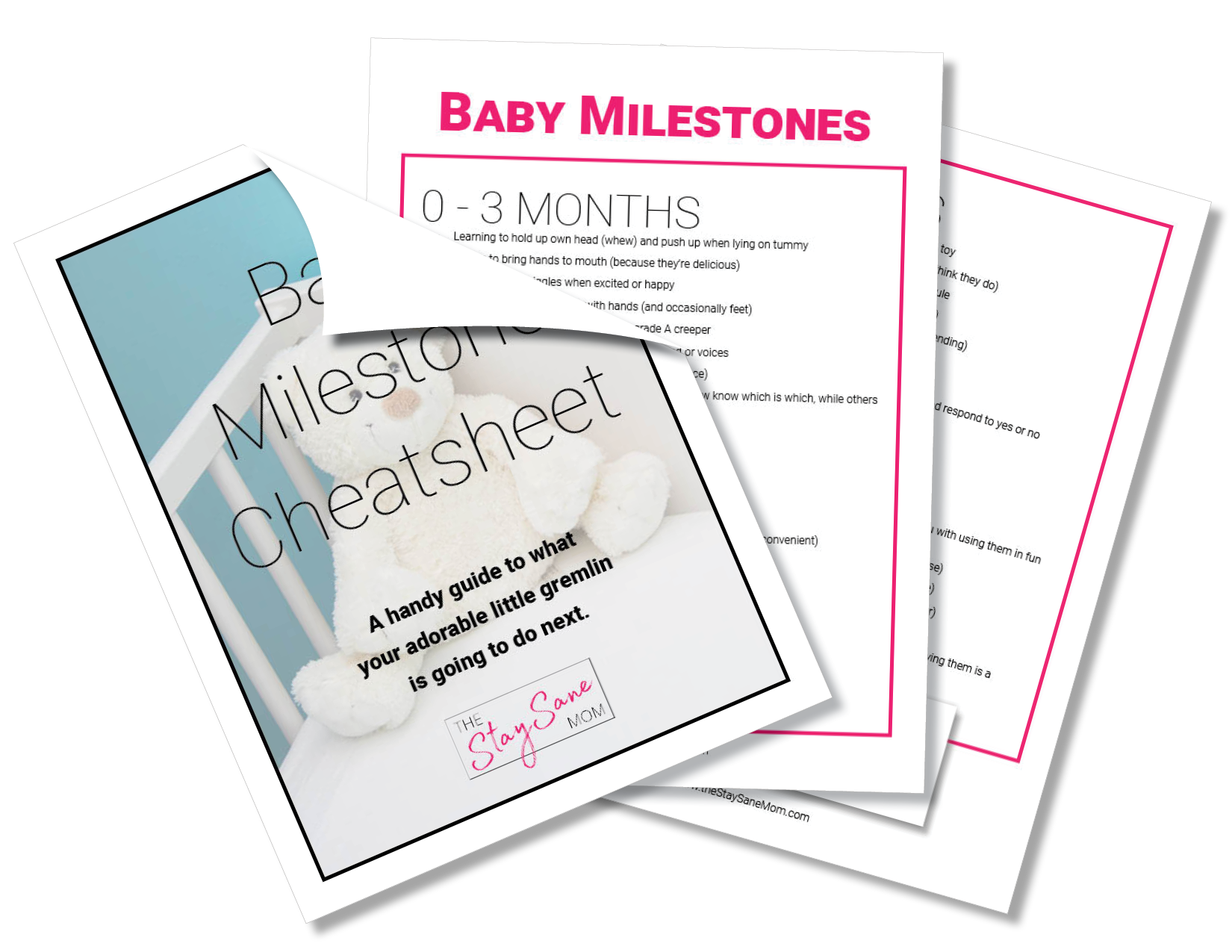Top Tips To Adjust To Life To A Newborn

Top Tips To Adjust To Life To A Newborn
Whether you're a new mom or a parenting veteran, the first few weeks at home with a newborn baby can be a serious roller coaster, both physically, emotionally, and mentally.
Written by Liz Bayardelle, PhD | See Comments | Updated 05/04/2021
Want to cut to the chase?
Baby Milestone Cheatsheet

Top Tips To Adjust To Life To A Newborn
This post contains some affiliate links for your convenience. Click here to read my full disclosure policy.
For any new parent, the first few weeks at home with a newborn baby can be a serious roller coaster, both physically, emotionally, and mentally. If you’re worried about how you’re going to adapt, try some of this advice and top tips for new mums on how to survive those all-important first few weeks with your newborn baby at home.
During your pregnancy, you were probably given all the classic advice that all new mums are given by well-meaning people. You were probably told things like ‘get outside for a few minutes every day’, ‘buy food you can eat with one hand’, ‘get your sleep when you can’, and ‘sleep when the baby sleeps’. (Yeah right.) As you get used to having a baby, you will start to be able to separate out the fact from the fiction from advice like this and realize what parts were exaggerated. At first, it can be hard to know what to expect.
If you’re a new parent, you’re probably in the same boat. Try this advice for new mums, and you’ll be able to survive and thrive during your first few weeks with a new baby at home.
Ask For Help
When you have a baby yourself, you might think back to when you visited friends with newborns, and wish that they had told you to help them with some chores, like doing the dishes, so they could get five minutes to take a shower. At the time, you probably didn’t think this would be the best use of your visit. Don’t be afraid to ask your friends and family for some help. They probably want to help you as much as they can, but they won’t always know what you need if you don’t tell them.
You can also reach out to professionals for more help or if you need advice. Ask the pros if you need some sleep, need breastfeeding advice, or need baby-proofing tips for your home. There are baby nurses, nannies, therapists, lactation consultants, and postpartum doulas can make your life easier. Choosing to hire any of these experts doesn’t say anything about your ability to be a mother, so don’t feel afraid to ask for the help you need.
Build A Routine
Babies can develop their routines early. Pay attention to your baby’s different cues and cries, and start to build up their routine. It can be helpful if you know what to expect, although your baby won’t always stick to your carefully planned schedule. Some mothers do well through the eat, sleep, play or eat, play, sleep routines.
You could also create your own routine based on what you and your baby need. It can help to use an app to make this schedule. You can use an app to keep track of your baby’s feedings, sleep, and tummy or reading time on your phone. When to start to see a pattern forming, you can use this to adjust your schedule. Even if you have just a little bit of control over what can be a busy and confusing time, it can feel like a big win for you.
Do Something For Yourself
Find forty minutes in your day for you and you alone.
If you're thinking "haha, very funny, what about 5?" then fear not. These forty minutes can be split into ten-minute chunks for a shower (pretty please), a walk, a cup of coffee, or send an email to a friend. Being able to do this will help you to feel more like yourself, and not just like ‘Mom’ all the time.
Of course, you can use your ten-minute slots however you like. Maybe you want ten minutes to do your makeup, even if you aren’t going anywhere. If you’re by yourself, put the baby on a lounger pillow or in a baby bouncer. As long as you can keep the baby in view, you can take the shower without feeling any guilt.
Make Healthy Choices
At first, while you’re still adjusting, you might feel a little bit down after your baby first comes home. Your moods will be erratic at first, which is normal. (Yay hormones!)
Remember too that you won’t look like your pre-baby self for a little while after you give birth. It might be tempting to just eat whatever you want, especially if you feel like comfort eating. This urge is normal and is mostly just because you’re tired. It’s quicker to eat junk than it is to make a healthy meal. If you’re already feeling unhappy with your body, you might think you don’t really care about what you eat at this point. However, you will feel so much better if you do manage to eat balanced meals, and healthy, nutritious foods.
Try to keep healthy snacks in the house that you can eat easily with one hand, as you will often be trying to eat while also holding, feeding, burping, or rocking the baby. Things like almonds, carrots, low-sugar granola, energy bars, or string cheese are all good options. Make sure you drink lots of water too. Stock up on snacks like this a few weeks before your due date, so the snacks are in the cupboard ready and waiting for you when you come home from the hospital.
Wear The Baby
This advice for new moms doesn’t always work for everyone, either moms or babies, but wearing your newborn can be a great thing to try for you and the baby. You can safely wear your baby from the time they are just a few days old, and the skin-to-skin contact can help to solidify your bond and your nursing relationship in the early days of motherhood.
It can also be a brilliant way to get your baby to go to sleep! Once the baby is snuggled in, you can walk around walk and bounce about for a bit and the baby is more likely to fall asleep. With the right baby-wearing gear, you can go to the store, sit and eat lunch (with both of your hands free), or your partner and you could go to dinner. (Or just take a mutual bonding nap in the same general area of the floor. Maybe touch feet or something.)
It might not be for you, but it’s definitely worth trying.
Take Care of Your Breasts
In all likelihood are, you are going to try breastfeeding, even if it’s just the first few days or weeks at home.
The baby’s sucking motion is stronger than most new parents realize (in fact, if your partner doesn’t believe you, tell them to put a clean finger into the baby’s mouth so they can experience it for themselves), which can make feeding uncomfortable until you get used to it. If you’re having trouble getting a good latch, this can result in cracked, bleeding, or even blistered nipples. This is very painful and can be upsetting while you’re trying to get the hang of feeding. Actually, this can happen even if you are getting a good latch. They're just hungry little buggers at first. Your poor boobs just don't know what hit them!
Make sure to gently wash your nipples after every feed and place a cool flannel on them to soothe them. You can also use a salve to help them heal up. Massage your breasts and use warm compresses to unclog ducts.
If you’re struggling, there are consultants who can help with breastfeeding. Remember too, it doesn’t work for everyone, and your baby will be fine, even if you can’t breastfeed. Don’t panic or beat yourself up about it if it doesn’t work out for you. Fed is best. Just hold the cheeseburgers until the baby grows teeth and you're doing great.
Focus on You and Your Family
If you and someone close to you were pregnant at the same time, you might be tempted to constantly compared notes.
So, naturally, you will likely find yourself doing the same thing and still making comparisons when your babies arrive. However, sometimes comparing notes like this can make you feel as though you are losing or that your baby is falling behind. For example, if your baby doesn’t gain weight as quickly as your friend’s baby, or if your friend is breastfeeding with no problems and you’re still struggling to get it to work, or even if your friend’s husband changes more nappies than yours does, you can soon end up feeling bad about your parenting and worrying that your baby isn’t thriving.
Try not to play this game of constant comparisons. Every family’s journey is different, so concentrate on doing what’s best for yours. All babies are different and will do things at different rates. If you are worried, speak to your doctor, but it’s likely that your baby will get there in their own time.
Remember, Every Stage Is a Stage
Your newborn will not be almost blind, unable to hold up their own head, and a voracious eating machine who needs to be fed every two hours forever (although it can feel like it when you’re tired). You won’t be a grumpy woman who’s isn’t allowed to exercise and can’t get a moment’s peace for the rest of your life. (Just the next 10ish years.)
Keep reminding myself that every stage will pass eventually. There was a light at the end of tunnel. While your baby is young, try to enjoy each stage for what it is, even if it’s tough. There will be a time when you feel nostalgic for this time, so savor it now.
Start Your Next Step
Baby Milestone Cheatsheet

Get Sanity, Delivered to Your Inbox.
Care to Share?
About the Author

Liz Bayardelle, PhD
Founder | Contributor
Liz (or Dr. Mommy, as her toddler started calling her after learning what a PhD was) is the happily sleep-deprived mom of a toddler (and professional raccoon noise impersonator), a sparkle-clad kidnado, a teenage stepdaughter, 200 cumulative pounds of dog, and herd of dustbunnies (if daily vacuuming doesn't occur). During nights and naptimes, she uses her PhD in business psychology as an author, speaker, and consultant. She also serves as an executive and principal for three companies, two of which she co-founded with her very patient (and equally exhausted) husband.





-Budget.jpg)